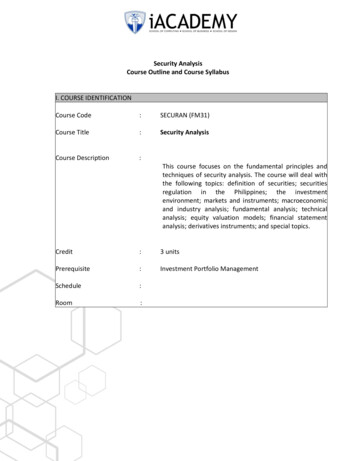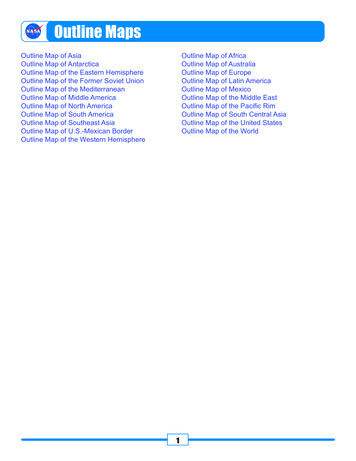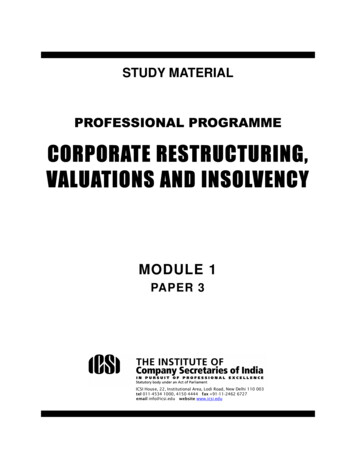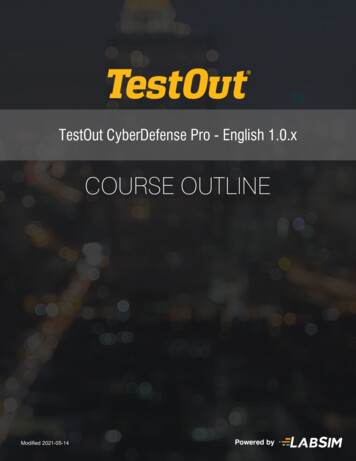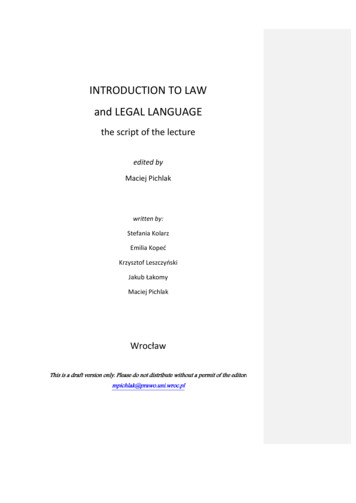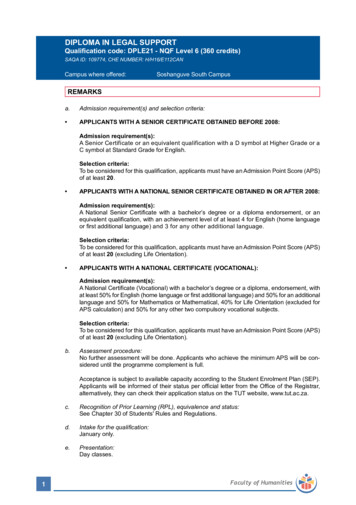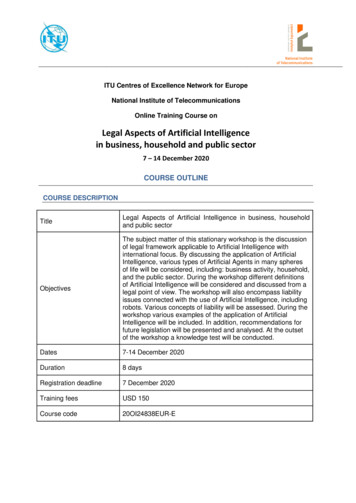
Transcription
ITU Centres of Excellence Network for EuropeNational Institute of TelecommunicationsOnline Training Course onLegal Aspects of Artificial Intelligencein business, household and public sector7 – 14 December 2020COURSE OUTLINECOURSE DESCRIPTIONTitleLegal Aspects of Artificial Intelligence in business, householdand public sectorObjectivesThe subject matter of this stationary workshop is the discussionof legal framework applicable to Artificial Intelligence withinternational focus. By discussing the application of ArtificialIntelligence, various types of Artificial Agents in many spheresof life will be considered, including: business activity, household,and the public sector. During the workshop different definitionsof Artificial Intelligence will be considered and discussed from alegal point of view. The workshop will also encompass liabilityissues connected with the use of Artificial Intelligence, includingrobots. Various concepts of liability will be assessed. During theworkshop various examples of the application of ArtificialIntelligence will be included. In addition, recommendations forfuture legislation will be presented and analysed. At the outsetof the workshop a knowledge test will be conducted.Dates7-14 December 2020Duration8 daysRegistration deadline7 December 2020Training feesUSD 150Course code20OI24838EUR-E
LEARNING OUTCOMESAt the end of the training, the participant should have gained an understandingof the key aspects of: Basics of artificial intelligenceMachine learning and algorithms of artificial intelligenceAutonomy of an artificial agentLegal framework for the assessment of legal status of artificial agentsLegal approach to robots as productsLegal approach to artificial agents as animalsLegal approach to artificial agents as natural persons and legal personsThe concept of liability of artificial agentsArtificial intelligence and personal data protectionProspective legal concepts of artificial intelligenceTARGET POPULATIONThe target group of this workshop include representatives of regulatory bodies, dealingspecifically with Artificial Intelligence issues, but also with consumer protection issues, cybersecurity issues, data protection issues.TUTORS/INSTRUCTORSNAME OF TUTOR(S)/INSTRUCTOR(S)CONTACT DETAILSDr Andrzej Krasuskiakrasuski@akrasuski.comEVALUATIONOn the last day of the course a quiz test will be assigned. It will consist of 20 questions(multiple choice) which should be solved in a time frame of 90 minutes, with at least 12correct answers (60%).The course evaluation for obtaining the certificate at the end is based primarily on the resultsfrom the Quiz, however, replies to the raised discussion topics may also be considered in theevaluation processTRAINING SCHEDULE AND CONTENTSThere are in total eight days, from which first 5 days (7 – 11 December 2020) there will begiven recorded video lectures, 2 per day, five days in total and that gives the total of 10 videolectures in this course. The lectures are on the following subjects:2
LectureSubjectLecture 1Mankind towards artificial intelligenceLecture 2Machine learning and algorithms of artificial intelligenceLecture 3Autonomy of an artificial agentLecture 4Legal framework for the assessment of legal status of artificial agentsLecture 5Legal approach to robots as productsLecture 6Legal approach to artificial agents as animalsLecture 7Legal approach to artificial agents as natural persons and legal personsLecture 8The concept of liability of artificial agentsLecture 9Artificial intelligence and personal data protectionLecture 10Prospective legal concepts of artificial intelligenceThe couse has a blended mode of a course, which means that there are live talks at face-toface course, which are well recorded, production is carried by the NIT (National Institute ofTelecommunication), Warsaw, Poland. While typical face-to-face courses last two full days,typical elearning (with reading materials, not video lectures) last four weeks, the blendedmode lasts 8 days, which provides feeling as in face-to-face lectures, but at the time suitablefor each participant, which gives flexibility and commodity provided by elearning courses viathe ITU Academy platform.The course begins on Monday, and ends next Monday.Each working day there will be posted a discussion topic before noon (according to theGMT 1 time) by the course tutor (posted in Forum) and they are intended to point to theparticipants the main subject covered in the video lectures on the given day.Participants could also raise their own discussion topic thread on the appropriate place for itthat is "General discussions" forum.At the end of each day, from Monday to Friday, I will give a summary of the day on theraised daily Forum topics.All course news and announcement will be given in the News Forum on the cover page ofthe course.3
DaysActivityExercises and interactionsDay 1LearningWatching and listening to video lectures 1 and 2.Answering on questions asked by the tutor, andpossibility to ask questions to him via course forum.Day 2LearningDay 3LearningDay 4LearningDay 5LearningDay 6-7Consolidation ofknowledgePossibility to watch all video lectures one again withpossibility to ask questions to the tutor.Day 8Solving the FinalQuizSolving the Final Quiz.Watching and listening to video lectures 3 and 4.Answering on questions asked by the tutor, andpossibility to ask questions to him via course forum.Watching and listening to video lectures 5 and 6.Answering on questions asked by the tutor, andpossibility to ask questions to him via course forum.Watching and listening to video lectures 7 and 8.Answering on questions asked by the tutor, andpossibility to ask questions to him via course forum.Watching and listening to video lectures 9 and 10.Answering on questions asked by the tutor, andpossibility to ask questions to him via course forum.METHODOLOGYThe course methodology will be as follows: Each day from 7 to 11 December 2020 there will be made available two recordedvideo lectures, which are recorded in the face-to-face ITU Centre of Excellenceworkshop organised by National Institute of Telecommunications in Poland. In totalthere are 10 video lectures during the course.Discussion forum will be organized based on discussion topics given on a daily basis,where students are highly encouraged to participate and interact with instructors andother students.Quiz test will be assigned on the last day of the course, 14 December 2020.All announcements for all events (lectures, quiz and forum) will be given in a timelymanner (prior to the event) by the course tutor.COURSE COORDINATIONCourse coordinator:ITU coordinator:Name: Sylwester LaskowskiEmail address: S.Laskowski@il-pib.plName: Jaroslaw PonderEmail address: jaroslaw.ponder@itu.int4
REGISTRATION AND PAYMENTITU Academy portal accountRegistration and payment should be made online at the ITU Academy portal.To be able to register for the course you MUST first create an account in the ITU Academyportal at the following ister.Course registrationWhen you have an existing account or created a new account, you can register for thecourse online at the following link: s-household-and-public-sectorYou can also register by finding your desired course in our training g-courses/full-catalogue.Payment1. On-line paymentA training fee of USD 150 per participant is applied for this training. Payment should bemade via the online system using the link mentioned above for training gencebusiness-household-and-public-sector2. Payment by bank transferWhere it is not possible to make payment via the online system, select the option for offlinepayment to generate an invoice using the same link as above. Download the invoice to makea bank transfer to the ITU bank account shown below. Then send the proof of payment/copyof bank transfer slip and the invoice copy to Hcbmail@itu.int and copy the coursecoordinator. All bank transaction fees must be borne by the payer.Failure to submit the above documents may result in the applicant not beingregistered for the training.3. Group paymentShould you wish to pay for more than one participant using bank transfer and need oneinvoice for all of them, create an account as Institutional Contact. Institutional Contactsare users that represent an organization. Any student can request to be an institutionalcontact or to belong to any existing organization.To do this, head to your profile page by clicking on the “My account” button in the usermenu. At the bottom of this page you should see two buttons:a. If you want to become an institutional contact, click on the “Apply to be anInstitutional Contact” button. This will redirect you to a small form that will ask forthe organization name. After you fill the name of the organization you want torepresent, click on “continue” and a request will be created. An ITU Academymanager will manually review this request and accept or deny it accordingly.b. If you want to belong to an existing organization, click on the “Request to belongto an Institutional Contact” button. This will redirect you to a small form that will askyou to select the organization you want to join from an organization list. After youselect the correct organization, click on “continue”, a request will then be created.5
The Institutional Contact that represents that organization will manually accept ordeny your request to join the organization.ITU BANK ACCOUNT DETAILS:Name and Address of Bank:Beneficiary:UBS Switzerland AGCase postale 2600CH 1211 Geneva 2SwitzerlandUnion Internationale des TélécommunicationsAccount number:240-C8108252.2 (USD)Swift:UBSWCHZH80AIBANCH54 0024 0240 C810 8252 2Amount:USD 150Payment Reference:CoE-EUR 24838 – P.40595.1.044. Other method of paymentIf due to national regulations, there are restrictions that do not allow for payment to be madeusing options 1 & 2 above, please contact the ITU coordinator for further assistance.CERTIFICATESEach fully registered participant who will successfully complete the course, based on theevaluation, will receive an ITU Certificate after the course.6
Lecture 9 Artificial intelligence and personal data protection Lecture 10 Prospective legal concepts of artificial intelligence The couse has a blended mode of a course, which means that there are live talks at face-to-face course, which are well recorded, production is carried by the NIT (National Institute of Telecommunication), Warsaw, Poland.
